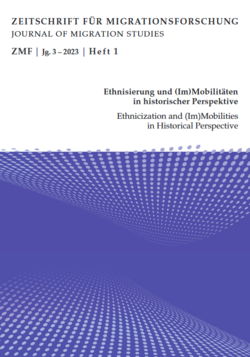Lucie Lamy | Associated Researcher
Home Institution
:
Université Paris Cité
|
Position
:
Postdoctoral researcher
|
Disciplines
:
Contemporary History
,
German studies
|
Biography
In 2024, Lucie Lamy defended a thesis in contemporary history at Université Paris Cité entitled "La Fabrication de l'appartenance. Être ou devenir germano-balte après la Seconde Guerre mondiale (1945-2004)" [The Making of Belonging. Being or Becoming a Baltic German after the Seconde World War], for which she was awarded the CIERA Michael Werner Prize 2025. This research, largely carried out at the Centre Marc Bloch, questions the contours of ethnic “Germanness” in post-1945 Europe, using the example of the “Baltic Germans” - the former German-speaking minority in Estonia and Latvia. It highlights the long-term consequences (in West Germany, East Germany, Soviet, then independent Latvia and Estonia) of the “ethnic cleansing” carried out during or after the Second World War.
Her new post-doctoral research project, still taking a transnational approach to the history of migration in Europe in the 20th century, now focuses on international educational mobility towards France and Germany from the 1960s to the 1990s. She is conducting this research as part of the DFG-AHRC project "University Students as Migrants: A New History of Educational Mobility in Western Europe", hosted by the Department Globalizations in a Divided World of the Leibniz-Zentrum für zeithistorische Forschung (ZZF) in Potsdam (Germany) and by the Northumbria University (UK).
Researchtopic
migration and mobility studies
Europe since 1945
international student mobility
transnational history
ethnic categories and minorities in East and West
"Baltic Germans" (FRG, GDR, Soviet and independant Estonia and Latvia)
Institution of thesis
Supervisor
University Students as Migrants: A New History of Educational Mobility in Western Europe
As a member of the research team for the project “University Students as Migrants: A New History of Educational Mobility in Western Europe”, I am investigating international student mobility towards France and Germany from the 1960s to the 2000s. Taking into account the changing global geopolitical context (decolonization, Cold War, European integration...), the project embeds educational mobility in the history of migration to and within Europe, and examines the development of this specific, selective migration regime in an inter- and transnational comparison. International students are considered not only as leaders-in-the-making and actors of soft power, but also as objects of migration policy. In a context in which other forms of migration are treated in an increasingly restrictive manner, this research draws on state archives as well as archival collections from international institutions, universities and student non-governmental organizations in order to take a differentiated look at the diverse experiences of international students and to examine their overlaps with other forms of migration.
Ethnisierung und (Im)Mobilitäten in historischer Perspektive
July 04, 2023Lucie Lamy , Sarah Marciano
Publications
Articles in scientific journals
Lamy, Lucie, « Ethnisierung und (Im)Mobilitäten in historischer Perspektive », Zeitschrift für Migrationsforschung, vol. 3, n° 1, 2023, p. 5‑25, https://journals.ub.uni-osnabrueck.de/index.php/zmf/article/view/218
Lamy, Lucie, "Negotiating Freedom of Movement through Ethnic Recategorization: Strategies of ›German‹ Special Settlers from Riga, 1945–1972", Zeitschrift für Migrationsforschung – Journal of Migration Studies, vol. 3, n° 1, 2023, p. 123-148, https://journals.ub.uni-osnabrueck.de/index.php/zmf/article/view/170
Lamy, Lucie, "Defining “Baltic Germanness” in Post-Soviet Latvia and Estonia: Ethnic Germans’ Life Stories between East and West", History of Communism in Europe, XI, 2020, p. 167‑188.
Lamy, Lucie, « Un « voyage dans le passé » ? Le tourisme du souvenir comme pratique culturelle mémorielle », Matériaux pour l’histoire de notre temps, n°133‑134, 2019, p. 66‑69, https://www.cairn.info/article.php?ID_ARTICLE=MATE_133-134_0066
Special issue edition
Ethnisierung und (Im)Mobilitäten in historischer Perspektive / Ethnicization and (Im)Mobilities in Historical Perspective, éd. L. Lamy, S. Marciano, Osnabrück, IMIS, 2023 (Zeitschrift für Migrationsforschung, (1) 3), https://journals.ub.uni-osnabrueck.de/index.php/zmf/issue/view/30
